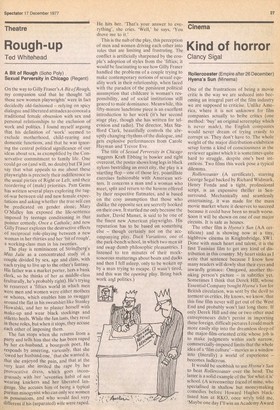Theatre
Rough-up
Ted Whitehead
A Bit of Rough (Soho Poly) Sexual Perversity In Chicago (Regent) On the way to Gully Fraser's A Bit o f Rough, my companion said that he thought 'all these new Women playwrights' were in fact decidedly old-fashioned — retying on spicy dialogue and liberated attitudes /o conceal a traditional female obsession With sex and personal relationships to the exclusion of work and politics. I found myself arguing that his definition of 'work' seemed to exclude motherhood, child-rearing and domestic functions, and that he was ignoring the central political significance of our ideas about sex, as exemplified by the Conservative commitment to family life. One could go. on (and will; no doubt) but I'll just say that what appeals to me about these playwrights is precisely their indifference to the usual pieties of Right or Left, and their reordering of (male) priorities. Pam Gems has written several plays exploring the tugof-war between old and new female.expecfations and asking whether the true self can be predicated on gender alone; Mary O'Malley has exposed the life-sentence imposed by teenage conditioning in that pointer comedy, Once a Catholic; and now Gilly Fraser explores the destructive effects of reciprocal role-playing between a new woman in her thirties and her 'bit of rough', a working-class man in his twenties. The play is reminiscent of Strin.dberg's Miss Julie as a concentrated study of a couple divided by sex, age and class, with each trying to live up to the other's fantasy. His father was a market porter, hers a bank Clerk, so he thinks of her as middle-class (culturally, he's probably right). He's trying to resurrect a 'fifties world in which men were men and women were either mothers or whores, which enables him to swagger around the flat in his sweatshirt like Stanley Howalski, and her to plaster herself with make-up and wear black stockings and Stiletto heels. While the fun lasts, they revel in these roles, but when it stops, they accuse each other of imposing them. The fun stops when she returns from a party and tells him that she has been raped by her ex-husband, a bourgeois poet. He responds by asserting, variously, that she 'owed her husband one,' that she wanted it, that she enjoyed the pain, and that at the very least she invited the rape by her Provocative dress, which goes incongruously with her 'seventies habit of not wearing knickers and her liberated language. She accuses him of being a typical Puritan misogynist who can only see women as possessions, and who would feel very different if his (separated) wife were raped. He hits her. 'That's your answer to everything', she cries. 'Well,' he says, 'You drove me to it.'
This is the nub of the play, this perception of men and women driving each other into roles that are limiting and frustrating. The conflict is artificially sharpened by the couple's adoption of styles from the 'fifties; it would be fascinating to see how Gilly Fraser handled the problems of a couple trying to make contemporary notions of sexual equality work in their relationship, when faced with the paradox of the persistent political assumption that childcare is woman's responsibility, and of social institutions still geared to male dominance. Meanwhile, this fifty-minute lunchtime piece is an excellent introduction to her work (it's her second stage play, though she has written for television and radio). The director, Max Stafford Clark, beautifully controls the abruptly changing rhythms of the dialogue, and gets explosive performances from Carole Hayman and Trevor Eve.
The title of Sexual Perversity in Chicago suggests Kraft Ebbing in bowler and tight overcoat, the poster shows long legs in black nylons bestriding an erect city, the play is a startling flop one of those fey, pointilliste exercises fashionable with American writers. It concerns a man and a woman who meet, split and return to the havens offered by their respective flatmates, and is based on the cosy assumption that those who dislike the opposite sex are secretly hooked on their own. It startled me only because the author, David Mamet, is said to be one of the finest new American playwrights. His reputation has to be based on something else — though certainly not on the accompanying play, Duck Variations, one of the park-bench school, in which two men sit and swap dumb philosophic pleasantries. I listened to ten minutes of their mocksonorous mutterings about boats and ducks and then I fell asleep, only to be woken up by a man trying to escape, (I wasn't tired, and this was the opening play. Bring back work ail,d politics.)


































 Previous page
Previous page